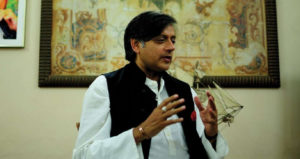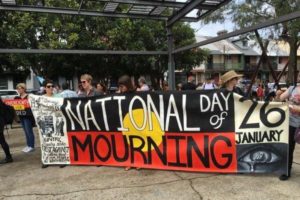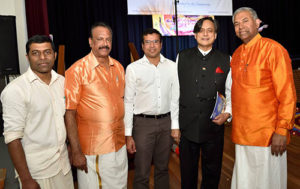Shashi Tharoor in conversation with Sudha Kumar
 On his recent visit to Sydney (3 September 2017) for ”˜Antidote ”“ Festival of Ideas, Art and Action’, Dr. Shashi Tharoor Former UN Diplomat, author, politician and proud father was gracious to give his time and share his thoughts with me on a range of issues.
On his recent visit to Sydney (3 September 2017) for ”˜Antidote ”“ Festival of Ideas, Art and Action’, Dr. Shashi Tharoor Former UN Diplomat, author, politician and proud father was gracious to give his time and share his thoughts with me on a range of issues.
From his ”˜central animating principle in all aspects of his life’, the writing prowess of his sons, his fond reminiscences of his ancestral home in Kerala, to religion and marriage equality in Indian society, and the concept of ”˜identity and belonging’ Shashi was most forthcoming. His responses to questions were never frivolous, were thoughtful, clear and peppered with humour. A person who uses the power of intellect, vocabulary and conviction in his expression, it was indeed a privilege and a delight to converse with Dr. Shashi Tharoor.
Here are the excerpts:
Sudha: Congratulations Dr. Tharoor on the launch of your book ”˜Inglorious Empire’. Hope you had a good time at the Melbourne Writer’s Festival.
Dr. Tharoor: Yes! it was a very good audience reaction at Melbourne and here also at Sydney.
Sudha: Thank you for your time this afternoon. The first Sunday of September is Father’s Day”¦ So Happy Father’s Day to you! You are a proud Dad to two sons. You have said that ”˜Kanishk (your son) is a better historian than me”¦.’
 Dr. Tharoor with his two sons, Kanishk and Ishaan
Dr. Tharoor with his two sons, Kanishk and Ishaan
Dr. Tharoor: He is a better writer than me ”¦.. both my sons’ writings are steeped in history and it is probably true that they both are better at everything than their father is, which of course is the ambition of all fathers, to be bypassed by their sons.
Sudha: Indeed. What makes a good historian though?
Dr. Tharoor: History to me is a set of events and forces in the past, that one needs to come to grips with from the perspective of the present. The story of a particular past event is influenced by one’s values, concerns and experiences of today. And therefore, a history written fifty years ago inevitably reads differently from a history of the same events or the same issues of the same period written today.
Sudha: From being born in the UK to schooling in different cities in South and North India to the US and then the UN, and now back in India representing your own people in Thiruvananthapuram, being the erudite personality that you are, what centres you Dr. Tharoor?
Dr. Tharoor: It’s a difficult question to answer. From a very young age we were brought up by our parents to want to make a difference so that has always been the central animating principle of my life, my work, my studies. I have always believed that one of the best reasons for being on this planet is to make a difference. Because ultimately we will all go, there is no permanence to our presence. So all we can do is to make a difference to those around us and I have tried to do that in my studies, University, work life at UN, now my political career and my writing. So”¦ all of that is a desire to make a difference.
 Sudha: Australia today is in the throes of social reckoning on two issues. Australia Day and Marriage Equality. Australia Day is celebrated on 26 January which is the day Captain Cook landed in Australia. Today the Indigenous people of Australia as well as the people who make up Australian society are re-looking and re-evaluating the significance of that day in their lives. There are periods in human history where many wrongs were committed – like, the Nazi holocaust and colonial racism which have caused colossal trans-generational trauma. Can these wrongs be corrected? Or, is even delving into it a correction of sorts?
Sudha: Australia today is in the throes of social reckoning on two issues. Australia Day and Marriage Equality. Australia Day is celebrated on 26 January which is the day Captain Cook landed in Australia. Today the Indigenous people of Australia as well as the people who make up Australian society are re-looking and re-evaluating the significance of that day in their lives. There are periods in human history where many wrongs were committed – like, the Nazi holocaust and colonial racism which have caused colossal trans-generational trauma. Can these wrongs be corrected? Or, is even delving into it a correction of sorts?
Dr. Tharoor: To begin with Australia was already discovered by people living here. So Cook didn’t discover Australia. Just as Columbus didn’t discover America, there were people living there already. (Even in terms of external voyages there seems to be others who got there before Columbus.) All this is a reflection of the inadequate frame of reference of those times, when a Europe centred world view was all that people were relying on. Secondly, even if it is not called a day of discovery of Australia, clearly it was a momentous occasion because in the wake of Cook came all these people who transformed this country. Today Australia is an overwhelmingly non-indigenous country. The experience of indigenous people has included near genocide in many cases, deaths, suffering, children being taken away from parents and range of human rights issues, which perhaps at that time was not fully realised as a wrong-doing. Every generation seems to act in its own framework of reference. Today it is too late to undo the damage. The dead cannot be brought back to life. Childhood cannot be given back. What is gone is gone. But at the same time, an acknowledgement of the wrong done, an apology and an atonement would be fitting. And I am glad to see that Australian Prime Ministers and leading politicians have felt possible to stand up and say this.
Sudha: Australia is going to have a national plebiscite on Marriage equality. What are your thoughts?
Dr. Tharoor: Well in India we are far behind in that debate. We are at a point where we need to decriminalise behaviour between consenting adults, and I have been an advocate of that. Whether that decriminalisation should lead to marriage rights, is a separate debate we haven’t yet had. In my own view I don’t see any particular difficulty with that, however I am not prepared to open that can of worms until our country has taken the first step yet. The truth is that, ours is in many respects a society that has been made more conservative by Muslim and British rule. The old Hindu society was much more liberal and inclusive and accepting of different forms of behaviours, (as) we can see from our own temple sculptures (and) carvings. But having got to a point where the British have shaped a lot of contemporary attitudes, we may have to take things one step at a time. Certainly after the Supreme Court’s recent ruling of the ”˜right to privacy’, Section 377 which criminalises homosexual relationships will not survive judicial scrutiny.
Sudha: The young should know their past, where they come from, how else will they know where they are going? It is all about ”˜identity and belonging’ isn’t it?
Dr. Tharoor: No, it is more than that. Identity does not change, but belonging does. One can move from India to Australia or America but ethnically you are still who you are, from your parents and grandparents. You cannot deny the past. Similarly, one needs to have a consciousness of historical facts. There is a reason why the world is the way it is today. It is because of what happened before. Being aware of it, to my mind is important. It goes beyond questions of belonging or allegiance.
Sudha: Your ancestral home and roots are in Elavancherry, Palakkad, Kerala. Life has taken you through many routes around the globe. How rooted are you to your roots?
Shashi Tharoor with his grandmother
Dr. Tharoor: Aah but those are different spellings of roots ..(laughs).. my roots in Kerala are ”˜r-o-o-t-s’, when you speak of my routes around the globe that is ”˜r-o-u-t-e-s’ ”¦.. (laughs)”¦ It is curious”¦ when I was a child, like many other children growing in the city, we were dragged back to the family village by our parents. My sisters and I resented it initially, and I used joke to my father this migration south is strictly for the birds. My ancestral ”˜tharavad’ home in the early 60s ”“ had many privations, there was no electricity, no indoor plumbing, we had to bathe out of buckets, toilets were in outhouses, we brushed our teeth and spat into the paddy fields outside the house porch ”“ a very different experience. But as we grew older we realised the charm of it. It didn’t exactly have the same association for us because our parents had grown up in those places. We had not grown up there, only visited, and as we grew up we began to realise the charm of it and made a conscious effort to go back every year to see the extended family ”“ cousins, uncles, aunts, and my grandmother who, bless her soul, lived to a ripe old age of 97. And my sisters in particular were able to transmit that down to the generations. One of the most precious photos in the family is five generations in one photograph – a rare one! Connections can be preserved. I feel confident even for this half American baby that’s my niece’s daughter- she is going to be brought up conscious of the fact that she has a part of her heritage in that old ”˜tharavad’ (ancestral home).
Sudha: Thanks to your very eloquent Oxford Union address followed by your books, in the recent past many Indians have become very aware of their colonial past. I am one of them. I have read your book ”˜An Era of Darkness’. It was pretty gut wrenching. I had to put the book down a few times. But what was worse was that even the educated never knew the facts. Is it fair to ask WHY?
Dr. Tharoor: Well obviously many of you didn’t pay attention in History! You got busy with Science and Math wanting to be Engineers and Doctors! I was one of the freaks who was obsessed with History”¦.. but jokes apart”¦ We never made a big deal of out of it. We (Indians) are from a forgive and forget culture, even our official education system didn’t want to make a big deal of it. We hailed our freedom fighters as heroes, but didn’t demonise the ones they fought against.
Sudha: As per 2016 Australian census, for the first time in Australia’s history, the number of people who claimed “no religion” (30%) was higher than Catholics (23%), who until then were the highest. Considering the current socio-political circumstances in India, do you think Indians should campaign for a “no religion” policy?
Dr. Tharoor: It is difficult. Religion is far too deeply immersed in Indian society and cultural experience. Its caught up in notions of culture, of authenticity, of rootedness, the rhythms of Indian life often are around religious festivals. There is nothing more important than the Durga Puja for people of Kolkota and nothing more important than Onam for Keralites, though must admit that Onam is a more secular festival. Though of religious origins everyone owns it today. But having said all of this, what is striking is that even officially-atheist political parties like the Communist parties compete with each other to construct the most lavish puja pandals. And that in a sense should make no sense, except that it does! For them it is going beyond. Whether you believe in the Goddess or not, it is part of your cultural identity as a Bengali.
Dr. Tharoor at the Malayali Association’s Onam celebration
Sudha: It connects them with the people I suppose”¦.
Dr. Tharoor: It connects them with the people and connects people with that cultural badge of honour of being a Bengali. So privately they may not bother to pray, but Durga, all the rituals associated with Her, and the whole occasion is of great importance to them. So we can appreciate that the place of religion in our society cannot be wished away. And also that somehow through education you create more atheists and agnostics is not necessarily true, and many educated people are devout believers not only in religion, but often in Godmen and spiritual leaders. There is something in the water perhaps in India that makes people like that. We saw this extraordinary uprising about this rapist Baba, and the question that comes up is, if people are willing to behave like this (turn against) over a person, who in many ways seem unworthy of their respect, then what more can one ask for when it comes to more serious issues involving religion. But for ”˜no- religion’ to be a bigger answer than the biggest faith is truly astonishing. Would not be true in US or UK.
Sudha: Considering your depth and breadth of cumulative knowledge and experience, what according to you is the most important contributor to the fabric of a robust thriving human society?
Dr. Tharoor: RESPECT for others. Ultimately that’s what makes a society work. If you respect others for who they are, let them be who they are, don’t try and encroach their space, don’t challenge them all the time, then you have a functioning society. That has been the greatest strengths of India, of Hinduism, in the past. A notion of acceptance, not toleration. Tolerance is slightly patronising. It assumes ”˜I know the truth, you are in error, but I’ll allow you to be in error. Whereas acceptance goes beyond tolerance- it says ”˜I believe I have the truth, you believe you have the truth. I will respect your truth, you respect my truth.’ And that is where India used to be the strongest. Today we have people who are sadly moving away.
Sudha: In your early years as a diplomat in Singapore, when asked about what is it that makes a mark on you, you said that it was the ”˜glimmer of hope in the eyes of people’ Today where do you see that ”˜glimmer of hope?’
Dr. Tharoor: Its there”¦ its there”¦. I see it always as a PROSPECT that things could be better than they are. That’s what keeps people going. And of course part of the job of a political leader is to give a basis for that prospect, to inspire that hope by promising action that will deliver of that hope.So many of us at our own level are also trying the same approach ”“ ”˜even if things are bad for you, we’ll do what we can to make it better.’
Sudha: Nehru described India as a ”˜palimpsest’. This beautiful artful thing, like a mural, which is the result of a number of people contributing different things, and therefore when you look at a twelfth century India it would look pretty different to a sixteenth century India. Considering all that you have talked about and all the books that you have written, would you give a space in that palimpsest to the British? Why? Or Why not?
Dr. Tharoor: Yes, definitely. They are all part of our history. They lasted two hundred years. And those two hundred years are more recent than two hundred and fifty years of Mughals or empires that came before them. Those two hundred years are relevant to us today and I would say as far as the British are concerned, its relevant on very many things- the sports we play, the language we speak, the beverage we drink at 4 O’ clock in the evening. All these things bear a British impress, and some would argue that even in our criticisms of the British, we use British forms of learning, reasoning and argument as well as language to challenge. So why not?
Sudha: If you found yourself stuck in an elevator with Mahatma Gandhi”¦what would you say to the great soul?
(Laughs”¦) Obviously I would express a great deal of reverence and respect for what he accomplished, but I would have so many questions to ask him. First of all, about how he felt about Nelson Mandela saying non- violence was not useful in the struggle against Apartheid, about India’s military strength, how we brought justice to Bangladesh by going to war against Pakistan, how he feels about his techniques like hunger strikes being used by politicians for lesser purposes. About the corruption that has invaded our society at all levels… And our politics ”¦ and our economics”¦ I think he’d have a lot of things to say too”¦ Or”¦. He may just turn around and say ”˜’Sorry it is my day of silence!’
Sudha: Thank you Dr Tharoor for your time and thoughts. Happy Onam!
Dr. Tharoor: Thank you. Wishing you a Very Happy Onam and All the best.
Short URL: https://indiandownunder.com.au/?p=9792




